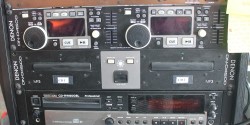We’re always interested in hearing from our readers and recently received an email from Myke Atkinson, the Station Manager of University of Calgary-based community radio station CJSW-FM in Calgary, Canada. He had written a piece about community radio for the National Campus/Community Radio Association’s email list and thought that it would be of interest to Radio Survivor readers. We couldn’t agree more. In discussing community radio in Canada, Atkinson asks whether it’s helpful anymore to view community radio as “alternative.” – Jennifer Waits, Radio Survivor
Alternative to What? Finding a Better Definition for Community Radio
by Myke Atkinson, Station Manager CJSW
A couple months ago I was down at CKXU in Lethbridge to help them kick off their FunDrive (which increased by over 30% this year to $21,575!) and as I was preparing for my talk I came to a bit of a realization about how we as community radio stations position ourselves to our listeners and the public at large.
I was sitting on the train in Calgary looking around at all the various folks. There was a couple sitting across from me speaking a language I will never understand, a new mom with her baby and stroller at the front of the car, and sitting in front of me was a leather-jacketed punk who was doing some serious damage to his ears with headphones. I realized that the train car I was sitting on embodied what we are as stations: a big mix of people from all walks of life coming together to bring their perspectives, knowledge and passion to make something great despite the differences between us. That’s the definition of a great community, and that is what we embody.
However, all of these thoughts on community made me think of something. Currently, we call ourselves an “alternative,” providing a space on the radio for music, ideas and voices not heard elsewhere on the dial. We define ourselves based on what we’re not (commercial radio, public radio) rather than what we are. I realize there’s a reason for this: we’re the new kids on the block in the radio game relative to the more traditional forms.
Commercial radio broadcasting in Canada has its roots in the late 1920s, while the advent of public radio (CBC) came a couple years later. Meanwhile, the only community radio station licensed around the same time was CFRC in Kingston, Ontario, and it wasn’t until forty years later that another community station was given a broadcast license. The real birth of community radio in Canada came even later (starting around 1975), therefore putting it almost a half-century behind its traditional counterparts. All of this said, the question that kept coming to my mind was “if commercial, public and community radio had all started at the same time, how would we define ourselves?”
I feel as though we would view ourselves (and be viewed by the communities we serve) as radio stations for people by people. I think we would lose all language of us versus them, the underdog versus the establishment, the Pepsi to their Coke. Instead we would view ourselves for the strengths of what we provide. If anything, the limited segments of the population served by traditional broadcasters would be viewed as the outlier where as we would be considered the radio of the people.
In order to take the next steps forward in our position within the radio space we need to stop defining ourselves in the shadow of those that came before us. We need to stop considering ourselves as the “alternative,” the gap-filler and catch-all for everything traditional media is not. It’s time to redefine ourselves by the thing that makes us the best: real radio made by real people in our communities.



